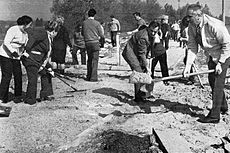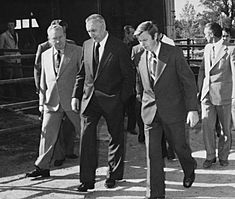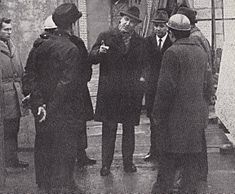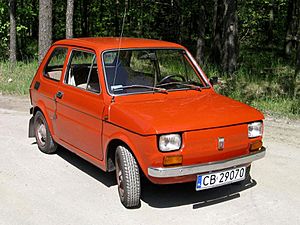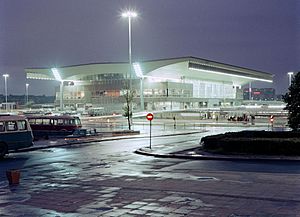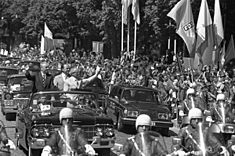Edward Gierek facts for kids
Quick facts for kids
Edward Gierek
|
|
|---|---|
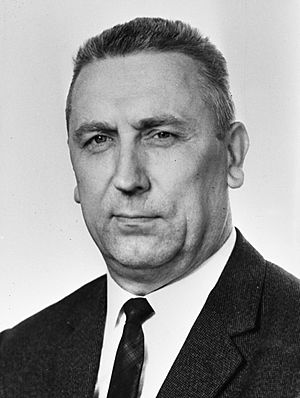
Gierek in 1980
|
|
| First Secretary of the Polish United Workers' Party | |
| In office 20 December 1970 – 6 September 1980 |
|
| Preceded by | Władysław Gomułka |
| Succeeded by | Stanisław Kania |
| Personal details | |
| Born | 6 January 1913 Porąbka, Congress Poland, Russian Empire |
| Died | 29 July 2001 (aged 88) Cieszyn, Poland |
| Political party | Polish United Workers' Party (1948–1981) |
| Spouse | Stanisława née Jędrusik (1918–2007) |
Edward Gierek (Polish pronunciation: [ˈɛdvart ˈɡʲɛrɛk]; 6 January 1913 – 29 July 2001) was a Polish Communist politician. He was the main leader of Poland from 1970 to 1980. Gierek became the First Secretary of the Polish United Workers' Party (PZPR). This was the ruling party in Poland at the time. He took over from Władysław Gomułka in 1970.
Gierek is known for opening Poland to countries in the Western Bloc. He also used foreign loans to improve Poland's economy. He lost power after workers went on strike. These strikes led to the Gdańsk Agreement. This agreement was between the government and workers of the new Solidarity trade union.
Edward Gierek was born in Sosnowiec, Congress Poland. His family was Catholic. He moved to France when he was young. In 1934, he was sent back to Poland for his communist activities. Later, he moved to Belgium to work as a coal miner. He learned French well, which helped him in his political future. During World War II, Gierek was part of the Belgian Resistance against the Germans. He returned to Poland in 1948, after living abroad for 22 years.
In 1954, he joined the Central Committee of the Polish United Workers' Party (PZPR). He represented the Silesian region. Gierek was known for being open and a good speaker. He became a respected politician. He was also against the strict rule of Władysław Gomułka.
Gomułka was removed from power after the 1970 Polish protests. These protests were stopped with violence. In December 1970, Gierek became the new First Secretary. He was the main leader of Poland. The first years of his rule saw more factories built. Living and working conditions also got better.
Because he had lived in Western Europe, Gierek brought new ideas to Poland. He made censorship less strict. This made Poland the most open country in the Eastern Bloc. Large amounts of money were borrowed from other countries. This money was used to build apartment buildings. It also helped create heavy steel and coal industries in his home region of Silesia. In 1976, Gierek opened Poland's first full highway. It went from Warsaw to Katowice. People still call it by his name today.
However, by the late 1970s, Poland's economy got worse. The country owed a lot of money. Rationing was started because of shortages. The government could not pay back its loans. In 1980, Gierek allowed the Solidarity trade union to form. This was part of the Gdańsk Agreement. It gave workers more rights. This was seen as a big change from communist rule. Gierek was removed from power, just like the leader before him.
Despite the economic problems, many remember Edward Gierek positively. They remember his love for Poland and his efforts to modernize the country. Over 1.8 million new apartments were built. This helped house the growing population. He also started the production of the Fiat 126 car in Poland. He oversaw the building of Warszawa Centralna railway station. This was Europe's most modern train station when it opened in 1975.
Contents
Edward Gierek's Early Life and Career
Edward Gierek was born in Porąbka, which is now part of Sosnowiec. His family worked in coal mining. His father died in a mining accident when Edward was four. His mother remarried and moved to northern France. Edward lived there from age 10. He started working in a coal mine at 13.
In 1931, Gierek joined the French Communist Party. In 1934, he was sent back to Poland for organizing a strike. After serving in the military in Stryi (1934–1936), Gierek married Stanisława Jędrusik. But he could not find a job. The Giereks then went to Belgium. Edward worked in the coal mines of Waterschei. He got a lung disease called pneumoconiosis from this work.
In 1939, Gierek joined the Communist Party of Belgium. During the German occupation, he joined the communist Belgian Resistance. They fought against Nazis. After the war, Gierek stayed active in politics among Polish immigrants. He helped start the Belgian branch of the Polish Workers' Party (PPR). He also led the National Council of Poles in Belgium.
Becoming a Polish United Workers' Party Leader
In 1948, Gierek was 35 years old. He had spent 22 years living abroad. The PPR leaders told him to return to Poland. He did, with his wife and two sons. He worked for the PPR in the Katowice area. In December 1948, he took part in a meeting. This meeting joined the PPR and the PPS. This created the Polish United Workers' Party (PZPR).
In 1949, he went to a two-year party course in Warsaw. He was seen as good at party work, even if not for intellectual tasks. In 1951, Roman Zambrowski sent Gierek to a coal mine where workers were striking. Gierek was able to calm the situation using talk, avoiding violence. He became a member of the Sejm, which is the Polish parliament, in 1952.
At the PZPR's Second Congress in March 1954, he became a member of the party's Central Committee. He led the Heavy Industry Division of the Central Committee. He worked directly under First Secretary Bolesław Bierut in Warsaw.
In March 1956, Edward Ochab became the party's first secretary. Gierek became a secretary of the Central Committee. On 28 June 1956, he was sent to Poznań. There, a workers' protest was happening. He then led a group to investigate why the Poznań events happened. Their report on July 7 blamed outside groups. In July, Gierek joined the PZPR Politburo. But he left that position in October. This was when Władysław Gomułka became first secretary. Gierek stayed a Central Committee secretary for economic matters. He returned to the Politburo in March 1959.
Leading the Katowice Industrial Region
In March 1957, Gierek also became the first secretary of the Katowice Voivodeship PZPR group. He held this job until 1970. He built up his power in the Katowice region. He became known as a leader of the party's younger, more technical members. Gierek was seen as practical and focused on economic progress. He was also known for being very loyal to Soviet leaders. He gave them information about the PZPR.
Because of his strong leadership in Upper Silesia and his good ties with the Soviets, many thought Gierek would replace Gomułka.
Gierek may have tried to make a move during the 1968 Polish political crisis. After a student protest in Warsaw on March 8, Gierek led a large meeting in Katowice on March 14. He was the first Politburo member to speak publicly about the protests. He said he wanted to show support for Gomułka. Gierek used strong words to criticize those he called "enemies of People's Poland." He said they were "disturbing the peaceful Silesian water." He warned them against turning the "nation" away from its "chosen path." The events of 1968 made Gierek's position stronger, even with his Soviet supporters.
First Secretary of the PZPR
When the 1970 Polish protests were stopped with violence, Gierek replaced Gomułka. He became the most powerful politician in Poland. In January 1971, he went to Szczecin and Gdańsk. He personally talked with the striking workers. The price increases that caused the protests were canceled. One popular decision Gierek made was to rebuild the Royal Castle in Warsaw. It was destroyed in World War II. State media highlighted his foreign upbringing and his French language skills.
Gierek's team brought a new generation of leaders. Many older party members were replaced by those who started their careers after World War II. This happened during and after the PZPR's Sixth Congress in December 1971. The new leaders were among the youngest in Europe. The government's role grew, while the party's role changed. Prime Minister Piotr Jaroszewicz was the most visible leader after Gierek. From May 1971, Gierek's rival, Mieczysław Moczar, lost influence.
According to historian Krzysztof Pomian, Gierek changed the government's approach to the Polish Catholic Church. He chose to cooperate with the Church. This gave the Church a special position during communist rule. The Church built more buildings. It also became an important third force in politics. It often helped solve problems between the government and opposition groups.
Economic Growth and Problems
The protests that removed Gomułka were mainly about money problems. So, Gierek promised to fix the economy. He started a plan to modernize factories and make more goods available. His plan mostly relied on borrowing a lot of money from other countries. It did not change the system much. The country saw a lot of investment in the early 1970s. This hid the need for deeper changes.
Gierek had good relationships with Western leaders. These included France's Valéry Giscard d'Estaing and West Germany's Helmut Schmidt. This helped him get foreign aid and loans. Gierek is known for opening Poland to Western political and economic ideas. He traveled a lot and welcomed important foreign guests to Poland. Three US presidents visited Poland during his rule. Gierek was also trusted by Leonid Brezhnev. This meant he could follow his policies without much Soviet interference. He easily gave the Soviets things that Gomułka would have seen as against Poland's interests.
The quality of life in Poland improved a lot in the early 1970s. For a while, Gierek was seen as a miracle worker. People could buy things like small cars. They could travel to the West more freely. Even the housing problem seemed to be getting better. Many years later, people remembered this time as the best in their lives.
However, the economy began to struggle during the 1973 oil crisis. By 1976, prices had to go up. The June 1976 protests were stopped harshly by police. But the planned price increases were canceled. Most of the foreign debt happened in the late 1970s. The government tried to deal with the crisis.
Crisis, Protests, and Opposition
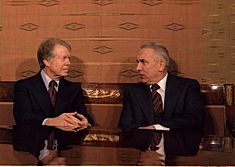
During Gierek's rule, organized opposition groups grew in Poland. Changes to the constitution were suggested in 1975 and 1976. These changes would make the state officially "socialist." They would also confirm the PZPR's leading role and the Polish-Soviet alliance. Many people opposed these changes. They sent protest letters. But the changes were supported at the PZPR's Seventh Congress in December 1975. The Sejm (parliament) mostly put them into law in February 1976. Organized opposition groups slowly grew. They had 3,000–4,000 members by the end of the decade.
Because the economy was getting worse, the government announced in late 1975 that food prices would go up. Prime Minister Jaroszewicz pushed for these price rises. They came with money payments that favored higher-income people. This policy was adopted even though Soviet leaders strongly objected. The price increase was announced by Jaroszewicz on June 24, 1976. Strikes started the next day. There were serious problems in Radom, at Warsaw's Ursus Factory, and in Płock. On June 26, Gierek ordered large public meetings. These were meant to show people's support for the party. They also condemned the "trouble makers."
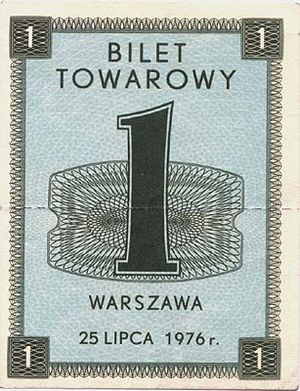
Brezhnev told Gierek not to change prices again. So, Gierek and his government tried other ways to fix the market. In August, "sugar coupons" were introduced to limit how much sugar people could buy. The time of "dynamic development" was over. These ration cards became a part of daily life in Poland until July 1989.
After the June 1976 protests, a major opposition group formed. It was called the Workers' Defence Committee (KOR). It started in September to help workers who were punished for protesting. Other opposition groups also formed from 1977–79. But the KOR was especially important.
In 1979, Poland's communist leaders reluctantly allowed Pope John Paul II to visit Poland. This was his first visit (June 2–10). The Soviets had advised against it. Gierek had met Pope Paul VI at the Vatican before. He talked with Pope John Paul II during his visit.
Gierek's Downfall
Gierek was upset by the failure of the 1976 price policy. His colleagues convinced him not to resign. But his team became more divided. One group, led by Edward Babiuch and Piotr Jaroszewicz, wanted him to stay. Another group, led by Stanisław Kania and Wojciech Jaruzelski, was less interested in keeping him as leader.
In May 1980, after the Soviet invasion of Afghanistan, Gierek arranged a meeting. It was between Valéry Giscard d'Estaing and Leonid Brezhnev in Warsaw. Just like with Władysław Gomułka ten years earlier, a foreign policy success made it seem like the Polish leader was safe. But the real problems were the worsening economy and worker unrest. In July, Gierek went to the Crimea for his usual vacation. He spoke there for the last time with his friend Brezhnev. Brezhnev gave a sad report on Poland's situation, including its huge debts. Gierek responded with hopeful predictions. He might not have fully understood how bad the country's situation was.
High foreign debts, food shortages, and old factories led to new economic reforms. Again, in the summer of 1980, price increases caused protests across the country. These were especially strong in the Gdańsk and Szczecin shipyards. This time, the government decided not to use force to stop the strikes. In the Gdańsk Agreement and other deals with Polish workers, Gierek had to allow them the right to strike. This led to the creation of the Solidarity labor union.
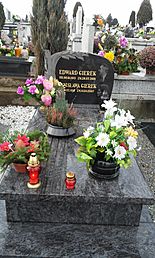
Soon after, in early September 1980, Gierek was replaced. The Central Committee's Sixth Plenum chose Stanisław Kania as the new party first secretary. Gierek was removed from power. He was a popular leader in the early 1970s. But he left surrounded by shame and jokes. Most of his former helpers left him. The Seventh Plenum in December 1980 blamed Gierek and Jaroszewicz for the country's problems. They were removed from the Central Committee.
The special Ninth Congress of the PZPR voted in July 1981 to remove Gierek and his close friends from the party. This was a very unusual step. They believed Gierek was responsible for the Solidarity crisis in Poland. The next first secretary, General Wojciech Jaruzelski, declared martial law in Poland on December 13, 1981. Gierek was held in a special camp for a year starting in December 1981. Unlike other opposition activists who were also held, Gierek did not gain public respect from this. He ended his political life as a main outcast.
Edward Gierek died in July 2001. He died from the miner's lung illness in a hospital in Cieszyn. This was near the mountain resort of Ustroń, where he spent his last years. Over time, his rule was seen in a more positive way. More than ten thousand people attended his funeral.
Edward Gierek and his wife, Stanisława née Jędrusik, had two sons. One of them is MEP Adam Gierek.
Edward Gierek's Legacy
In 1990, two books based on interviews with Gierek were published in Poland. They became very popular.
Polish society has different views on Gierek. Some remember his government fondly. They recall the better living standards Poles had in the 1970s under his rule. He is unique among PZPR leaders. The Polish public has shown signs of missing Gierek, especially after he died.
Others say that improvements only happened because of bad policies. These policies relied on huge foreign loans. This led directly to the economic problems of the 1970s and 1980s. Looking back, the total of over 24 billion dollars borrowed (in 1970s money) was not spent well.
When he became first secretary in December 1970, Gierek promised that people would not be shot in the streets under his watch. In 1976, security forces did step in during strikes. But they gave up their firearms. In 1980, they did not use force at all.
According to sociologist Maciej Gdula, big social and cultural changes happened in Poland in the 1970s. These changes were even bigger than those in the 1990s. He said that the idea of how power works in Polish society has been the same since the 1970s. The time of "mass solidarity" (1980–81) was an exception. Since Gierek's time, Polish society has been shaped by the ideas of the growing middle class. Words like management, initiative, and personality became important. The idea of "get educated, work hard and get ahead" became popular. Workers lost their special status and became a less important group.
Awards and Honors
- Poland
| Order of the Builders of People's Poland | |
| Order of the Banner of Work (1st Class) | |
| Cross of Merit (Gold Cross) | |
| Partisan Cross | |
| Medal for Long Marital Life |
- Foreign Awards
| Grand Cordon of the Order of Leopold (Belgium) | |
| Order of José Martí (Cuba) | |
| Grand Cross of the Legion of Honour (France) | |
| Grand Collar of the Order of Prince Henry (Portugal) | |
| Order of the Yugoslav Star, 1st class (Yugoslavia) | |
| Order of Lenin (USSR) | |
| Jubilee Medal "In Commemoration of the 100th Anniversary of the Birth of Vladimir Ilyich Lenin" (USSR) | |
| Order of the October Revolution (USSR) |
See also
 In Spanish: Edward Gierek para niños
In Spanish: Edward Gierek para niños
 | Bessie Coleman |
 | Spann Watson |
 | Jill E. Brown |
 | Sherman W. White |


